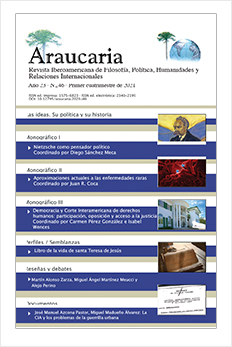La concepción relacional de la justicia y los límites de las reivindicaciones legítimas: la cooperación, la reciprocidad y la interacción
DOI:
https://doi.org/10.12795/araucaria.2021.i46.02Keywords:
justicia global, estructura social, injusticia estructural, complejidad global, marcos de la justiciaAbstract
Desde una concepción relacional de la justicia de inspiración rawlsiana, las ideas de la cooperación, la reciprocidad y la interacción han sido propuestas para interpretar el fundamento de las reivindicaciones legítimas de justicia distributiva y para restringir su ámbito de aplicación a sociedades políticas o Estados particulares. En este artículo se analizan los principales intentos de justificar esta restricción y se argumentará en contra de ellos. Se finalizará con la presentación de otra forma de interpretar la concepción relacional de la justicia que posibilita una aproximación crítica a las complejas injusticias con las que nos interpela nuestro mundo en globalización.
Downloads
References
Abizadeh, Arash, Cooperation, Pervasive Impact, and Coercion: On the Scope (not Site) of Distributive Justice, Philosophy & Public Affairs, 35 (4), 318-358, (2007).
Armstrong, Chris, Coercion, Reciprocity, and Equality Beyond the State, Journal of Social Philosophy, 40 (3), 297-316, (2009).
Blake, Michael, Distributive Justcie, State Coercion, and Autonomy, Philosophy & Public Affairs, 30 (3), 257-296, (2001).
Bunge, Mario, Systemism: the alternative to individualism and holism, Journal of Socio-Economics, 29), 147-157, (2000).
Caney, Simon, Global Distributive Justice and the State, Political Studies, 56), 487-518, (2008).
Castoriadis, Cornelius, La institución imaginaria de la sociedad (Ciudad de México: Tusquets, 2013).
Cohen, Joshua, y Sabel, Charles, Extra Rempublicam Nulla Justitia?, Philosophy & Public Affairs, 34 (2), 147-175, (2006).
Faist, Thomas, Migración y teorías de la ciudadanía. En P. Mateos (Ed.). Ciudadanía múltiple y migración : perspectivas latinoamericanas (25-56). (Ciudad de México: CI-DE/CIESAS2015).
Forst, Rainer, Towards a critical theory of transnational justice, Metaphilosophy, 32 (1/2), 160-179, (2001).
Forst, Rainer, Transnational justice and democracy, Normative orders, 04/2011), (2011).
Fraser, Nancy, Injustice at Intersecting Scales: on “Social Exclusion” and the “Global Poor”, European Journal of Social Theory, 13 (3), 363-371, (2010).
Freeman, Samuel, The Law of Peoples, Social Cooperation, Human Rights, and Distributive Justice, Social Philosophy and Policy, 23 (1), 29-68, (2006).
Habermas, Jürgen, ¿Una constitución política para una sociedad mundial pluralista? Entre naturalismo y religión (315-355). (Barcelona: Paidós2006).
Haslanger, Sally, What is a (social) structural explanation? Springer Science+Business Media, doi:10.1007/s11098-014-0434-5 (2015).
Mezzadra, Sandro, Derecho de fuga. Migraciones, ciudadanía y globalización (Madrid: Traficantes de sueños, 2005).
Mezzadra, Sandro, y Neilson, Brett, La frontera como método (Madrid: Traficantes de sueños, 2017).
Milanovic, Branko, Desigualdad mundial: un enfoque para la era de la globalización (Ciudad de México: Fondo de cultura económica, 2017).
Miller, Richard W., Globalizing Justice. The Ethics of Poverty and Power (Oxford: Oxford University Press, 2010).
Moellendorf, Darrel, Cosmopolitanism and Compatriot Duties, The Monist, 94 (4), 535-554, (2011).
Nagel, Thomas, El problema de la justicia global, Revista Jurídica de la Universidad de Palermo, 9 (1), 169-196, (2008).
Rawls, John, La justicia como equidad. Una reformulación (Barcelona: Paidós, 2002).
Rawls, John, Teoría de la Justicia (Ciudad de México: Fondo de cultuta económica, 2014).
Rodrigo, Ángel J., Entre Westfalia y Worldfalia: la comunidad internacional como comunidad social, política y jurídica. En C. García Segura (Ed.). La tensión cosmopolita. Avances y límites en la institucionalización del cosmopolitismo (23-63). (Madrid: Tecnos2016).
Sager, Alex, Methodological Nationalism, Migration and Political Theory, Political Studies, 64 (1), 42-59, doi: https://doi.org/10.1111/1467-9248.12167 (2016).
Sangiovanni, Andrea, Global Justice, Reciprocity, and the State, Philosophy & Public Affairs, 35 (1), 3-39, (2007).
Sangiovanni, Andrea, Justice and the Priority of Politics to Morality, The Journal of Political Philosophy, 16 (2), 137-164, (2008).
Sangiovanni, Andrea, The Irrelevance of Coercion, Imposition, and Framing to Distributive Justice, Philosophy & Public Affairs, 40 (2), 79-110, (2012).
Sassen, Saskia, ¿Perdiendo el control? La soberanía en la era de la globalización (Barcelona: Bellaterra, 2001).
Scheffler, Samuel, Individual Responsibility in a Global Age Boundaries and Allegiances: Problems of Responsibility and Justice in Liberal Thought. (Oxford: Oxford University Press2001).
Sewell, William H., A Theory of Structure: Duality, Agency, and Transformation, American Journal of Sociology, 98 (1), 1-29, (1992).
Tan, Kok-Chor, The Boundary of Justice and the Justice of Boundaries: Defending Global Egalitarianism, Canadian Journal of Philosophy, XIX (2), 319-344, (2006).
Walzer, Michael, Just and Unjust Wars. A Moral Argument woth Historical Illustrations 4ª ed. (Nueva York: Basic Books, 2006).
Wimmer, Andreas, y Schiller, Nina Glick, Methodological nationalism and the study of migration, European Journal of Sociology, 43 (2), 217-240, (2002).
Young, Iris Marion, Responsabilidad por la justicia (Madrid: Morata, 2011).
Downloads
Published
How to Cite
Issue
Section
License
Las ediciones impresa y electrónica de esta Revista son editadas por el Secretariado de Publicaciones de la Universidad de Sevilla, siendo necesario citar la procedencia en cualquier reproducción parcial o total.Salvo indicación contraria, todos los contenidos de la edición electrónica se distribuyen bajo una licencia de uso y distribución “Creative Commons Atribución-NoComercial-SinDerivar 4.0 Internacional”








